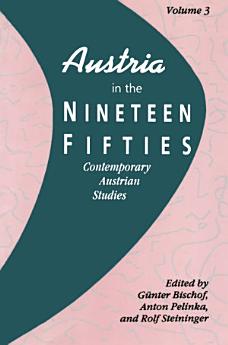Austria in the Nineteen Fifties
Gunter Bischof
mars 2020 · Routledge
E-bok
312
Sidor
family_home
Kvalificerad
info
reportBetyg och recensioner verifieras inte Läs mer
Om den här e-boken
In American history the 1950s are remembered as an affluent and harmonious decade. Not so in Austria. That nation emerged out of World War II with tremendous war-related destruction and with a four-power occupation that would last for ten years until 1955. Massive American economic aid enabled the Austrian economy to start recovering in the 1950s and reorient it from East to West. Unlike the United States, however, general affluence did not set in until the 1960s and 1970s even though Austria's dramatic baby boom enabled it to recover from the demographic catastrophe resulting from manpower losses of World War II., This volume deals with these larger trends. Stephen E. Ambrose discusses American-European relations and sets the larger international context for the Austrian scene. Oilver Rathkolb retraces the changing importance of the Austrian question for the Eisenhower administration. Michael Gehler presents an in-depth analysis of the intriguing question of whether Austria's unification at the price of permanent neutrality might have been a model for Germany. Franz Mathis and Kurt Tweraser look at economic reconstruction and the roles played by both the Austrian public industrial sector and the American Marshall Plan. Karin Schmidlechner looks at the youth culture of the era. Franz Adlgasser shows how Herbert Hoover's food aid was instrumental in the containment of communism in Hungary. Beth Noveck analyzes Austrian political culture of the First Republic from the perspective of Hugo Bettauer. Rolf Steininger presents an insightful historical overview of how the Austro-Italian South Tyrol conflict was resolved after seventy-five years of tension.
Om författaren
Günter Bischof is an assistant professor of history and the associate director of the Eisenhower Center at the University of New Orleans. Anton Pelinka is a professor of political science at the University of Innsbruck and also the director of the Institute of Conflict Research in Vienna. Rolf Steininger is a professor of history and the director of the Institute of Contemporary History at the University of Innsbruck.
Betygsätt e-boken
Berätta vad du tycker.
Läsinformation
Smartphones och surfplattor
Installera appen Google Play Böcker för Android och iPad/iPhone. Appen synkroniseras automatiskt med ditt konto så att du kan läsa online eller offline var du än befinner dig.
Laptops och stationära datorer
Du kan lyssna på ljudböcker som du har köpt på Google Play via webbläsaren på datorn.
Läsplattor och andra enheter
Om du vill läsa boken på enheter med e-bläck, till exempel Kobo-läsplattor, måste du ladda ned en fil och överföra den till enheten. Följ anvisningarna i hjälpcentret om du vill överföra filerna till en kompatibel läsplatta.





